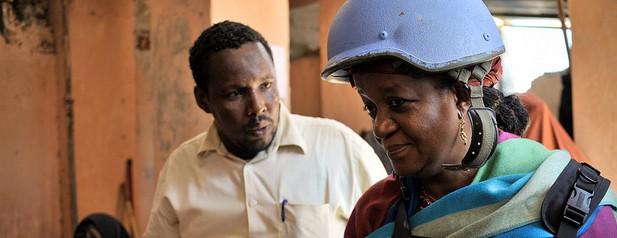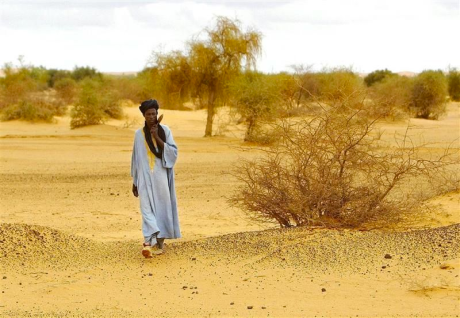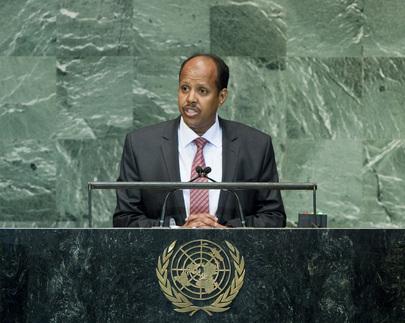Zainab Bangura: Islamist groups have institutionalised the brutalisation of women

“With governments, we seem to have a roadmap in tackling sexual violence, but globally it’s non-state actors that are the worst perpetrators. How do you get these people held accountable?”

Zainab Bangura, UN Special Representative on Sexual Violence in Conflict, on a visit to Somalia. Credit: UN/Tobin Jones.
Born in a small rural town in northern Sierra Leone, Zainab Bangura was expected by her father to stay at home, marry young and live a quiet life nearby. But looking back at her 56 years, she could not have confounded those expectations much more. As a woman’s rights activist, a civil society leader, a government minister, and now the UN’s Special Representative on Sexual Violence in Conflict, Bangura has been anything but quiet.
African Arguments caught up with her to talk about how to deal with impunity for sexual abuses, how to tackle Islamist militant groups’ treatment of women, and whether Sierra Leone’s President Koroma ought to have “more time” in office.
You’ve been in your role at the UN now for four years. Have you seen progress on the issue of sexual violence in conflict over that time?
There’s definitely been progress, first and foremost through the commitment of the UN Security Council which has developed a global leader framework with various resolutions, each one strengthening the last. However, it’s my role is to translate these resolutions into action on the ground. That’s where the crimes are being committed and where the people with the primary moral and legal responsibility to protect their citizens are.
I have been trying to increase political commitment at the national level into changing laws, training police, strengthening the military justice system, and making sure people who commit these crimes are actually tried.
It’s well and good to have resolutions and government commitments, but in parts of the eastern Democratic Republic of Congo, for example, the state may be absent, there are few mechanisms for accountability, and sexual violence is used as a weapon of war often by non-state militias. How can your work become relevant down at this level?
So far, we’ve been successful in working with national militaries. We have a long history of working with these groups and understand their command structures so it’s easier to engage them. That’s what we’ve done in the Congo where we’ve strengthened their military justice system, trained magistrates, and set up mobile courts. Sexual violence committed by the military has decreased 50%.
However, half of sexual violence there is being committed by non-state actors. That’s about 40 to 50 militias who have no command structure and no training, and about 6 or 7 foreign groups who have no regard for the law. How do you get these people held accountable? That’s our biggest challenge.
With governments, we seem to have a roadmap in tackling sexual violence, but globally it’s non-state actors that are the worst perpetrators. In last year’s report, 40 of the 45 offenders we listed were non-state actors – people with no notion of international borders or international law. Sexual violence in conflict is an issue as old as war itself. But now we have to engage more parties to tackle it. And for the first time, we’re actually meeting and engaging with non-state actors.
Some of the worst perpetrators of sexual violence in conflict today are Islamist militants, and the UN has very little leverage when it comes to these groups. What role can you play?
In places like Syria, there’s hardly anything you can do with the likes of Islamic State (IS) and al-Nusra, and we’re facing the problems being created by Islamist groups all the way from Libya, Mali and Nigeria to Yemen and Iraq. This is extremely difficult because these groups have institutionalised the brutalisation of women and it’s become part of their political economy. It’s a whole different challenge.
However, the first thing we’ve done is to make sure the world realises this problem is not just an issue of gender-based violence. The protection and empowerment of women has to be included in the heart of counter-terrorism strategy, because it’s part of Islamic State’s strategic objectives to dehumanise women and a core part of their political economy. The UN in 2014 estimated that IS had raised $35-45 million through the selling or ransoming of women and girls in just the previous year.
At the same time, we need to ensure we don’t only see women as victims but also look at the role they play in enticing other women and young men to join. You have to look at women from both the good side and bad.
How have the scores of recent allegations of sexual abuse by UN peacekeepers in the Central African Republic affected your work? How can you to talk about holding armies and militias accountable for sexual violence when the UN’s own soldiers are accused of horrendous and widespread abuses?
After the problems in CAR and DRC, the UN Secretary-General appointed a high level panel with very strong recommendations. Previously there was no mechanism for responding, but I think the Secretary-General wants to leave a legacy in this particular area, so now when troops commit crimes, they take the entire battalion out and their salaries are stopped. Within 48 hours of news breaking that a peace-keeper has committed a crime, the country is notified, that person is evacuated, and the country has to send an investigation team immediately. I think we’ve moved faster within the last couple months than the previous five years or more.
You first became a public figure during the civil war in Sierra Leone (1991-2002) when you spoke out against abuses being carried out by the warring parties. What led you to speak out and how did it feel to put yourself in the firing line?
I come from a very traditional background. My mother was illiterate and my father was a Muslim cleric. At a very early age, I experienced the disadvantage of being female. My father wanted me to drop out of school to get married aged 12 but my mother said no. So my father just said ‘then that’s it’ and walked out on us. When I lost my mother after university, my father still played a very prominent role in the funeral because he was a man and I was a woman, even though he’d left us years ago. That was the moment I made the decision to fight for women’s rights.
However, as I started my campaign, we had a coup and the military took over. It dawned on me that all rights were suspended so I shifted from fighting for women’s rights to democratic rights.
Eventually we had elections, but I realised democracy was a process, not an event. Usually the international community focuses on just elections, but few resources are spent on strengthening democratic institutions and for a country like Sierra Leone that’s had almost three decades of one-party rule and military dictatorship, all the institutions have collapsed.
So I gave up my insurance job and created an organisation on human rights and good governance. But it wasn’t easy. While we were fighting against the military government, we were seen as allies of those who became our leaders, but as soon as the civilian government took office we were seen as enemies of the state.
Sierra Leone has now been at peace for nearly 15 years, with Ernest Bai Koroma as president for nine of those. What’s your assessment of how far the country has come?
I knew President Koroma from aged 12. He was very smart and brilliant in school. And then we both worked in insurance at the same company where I served under him. When I joined him in government as foreign minister and then health minister, I was impressed by his very clear vision for the country. However, Sierra Leone has come through a lot of difficult times. It is like someone who has been beaten over the years and all their arms and legs are broken.
I think the biggest challenge in retrospect is that building a country takes much more time than we thought. People always talk about restoring a state but you cannot restore a state that was not functioning.
I’ve also learnt is that no single individual can do it all. You have to do it collectively with a group of people. President Koroma has his clear priorities – energy, infrastructure, health, education – but implementing it has been extremely difficult. And I have to be extremely honest: a lot of people who have worked with him don’t seem to have the same vision and energy.
Furthermore, just when the country was moving very fast, we had the Ebola outbreak. We lost a lot of human resources and income, unemployment rose and GDP has dropped. All the gains we made in the last five years have been lost.
In that case, should President Koroma get “more time” beyond his two term limit, which officially expires in 2018, as some supporters have called for?
He has said to me over and over, both when I was in government and again as recently as Christmas, that he has no intention of changing the constitution. Former colleagues in government have told me they want him to stay, but I tell them it’s the decision of the president. If he says he doesn’t want to stay, he doesn’t want to stay. I know deep down in my heart of hearts he wants to leave. You just have to look at the man’s hair. It’s gone grey. I don’t think he has a single black hair on his head! He’s exhausted.
Will you be returning to Sierra Leone’s political scene?
Well, eventually I have to return. The UN job is not permanent and I am there until the end of March. I only hope I’ll have the opportunity to contribute that experience to my country. I think there’s a lot I have learnt and can do for Sierra Leone. I hope it happens, but I’m not in any hurry.
James Wan is editor of African Arguments. Follow him on twitter at @jamesjwan.






